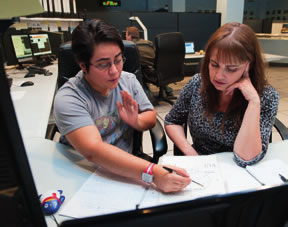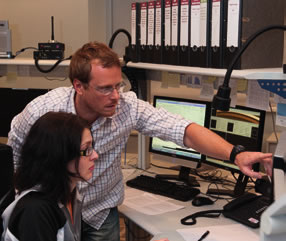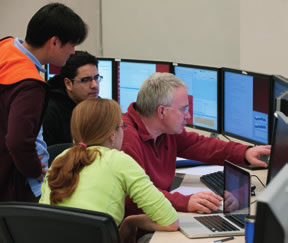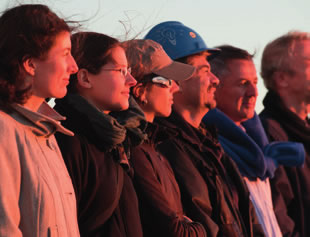Share
Working at ESO
Are you interested in working in areas of frontline technology and in a stimulating international environment? Do you feel your profile matches our requirements? Learn more about our current vacancies and apply online. Read more..








The European Organisation for Astronomical Research in the Southern Hemisphere (ESO) is the foremost intergovernmental astronomy organisation in Europe and the world's most productive ground-based astronomical observatory. ESO carries out an ambitious programme focused on the design, construction and operation of powerful ground-based observing facilities enabling astronomers to make important scientific discoveries.
ESO operates three unique world-class observing sites in northern Chile: La Silla, Paranal and Chajnantor (home to ALMA and APEX), and the ESO Headquarters are located in Garching, near Munich, Germany.
At Paranal, ESO operates the Very Large Telescope, the world's most advanced visible-light astronomical observatory, and will host and operate the southern array of the Cherenkov Telescope Array, the world's largest and most sensitive high energy gamma-ray observatory. ESO is a major partner in ALMA, the largest astronomical project in existence. And on Cerro Armazones, ESO is building the 39-metre Extremely Large Telescope (ELT), which will become "the world's biggest eye on the sky" and whose operations will be fully integrated into the Paranal Observatory.
ESO is advertising the position of the
Director of La Silla Paranal Observatory
Santiago
Deadline 04/02/2024
The La Silla Paranal Observatory (LPO) provides and operates some of the world's largest and most advanced observational facilities at three sites in Northern Chile. La Silla hosts the 3.6-m telescope, the New Technology Telescope (NTT), and a number of Hosted Telescope projects. Cerro Paranal is the home of the Very Large Telescope, the VLT, the VLT Interferometer (VLTI), the VISTA survey telescope, and several Hosted Telescope projects. Paranal Observatory will further be responsible for the operation of the ELT at Cerro Armazones and the southern array of the Cherenkov Telescope Array Observatory (CTAO). APEX, the Atacama Pathfinder Experiment, is a hosted sub-mm telescope project located on the high-altitude site of Llano Chajnantor. The LPO division further works in close collaboration with the Data Management and Operations (DMO) division, and other ESO organisational units.
We are looking for someone who can lead the La Silla Paranal Observatory through the next exciting stage of its development, and can drive the Observatory forward to become, with the integration of the ELT, the most powerful - while environmentally, financially, and socially sustainable - observatory of its type on the planet. To do so you must have vision as well as practical experience of running a successful and highly productive scientific organisation or research infrastructure. By building on our success to date you will become the next leader of our future Observatory.
Main Duties and Responsibilities:
As the LPO Director you will be responsible for
- the efficiency and effectiveness of the operation of the LPO and its three sites in delivering scientific data of highest quality and quantity to the scientific community;
- the functioning of the Observatory within ESO's end-to-end science operations model including fostering a close relationship with the Observatory back-end functions within the Data Management Operations division;
- the management and safety of the LPO sites and its staff (today LPO employs some 175 staff members), visitors and contractors;
- scheduling the telescopes for science and engineering, focussing on technical and engineering aspects rather than scientific proposal selection;
- developing an annual resource plan for review and approval and ensuring its execution (today LPO's annual expenditure budget is some 50 MEUR);
- recruiting and maintaining high quality scientific, technical, and administrative staff;
- developing short- to long-term development plans for the Observatory;
- setting the overall goals, priorities, and strategies within LPO for all operational and development aspects in consultation with the respective Programme Scientists;
- managing the organisational change implied by the transition of LPO into the ELT era;
- reporting on the performance and development of the LPO to ESO's governing and advisory bodies.
As LPO Director you will further act as the Programme Manager for all LPO development projects and will be the interface to all other programmes and organisational units at ESO. In this respect, the ongoing Integrated Operations (IOP) Programme to develop and implement a sustainable operation model for the future Paranal Observatory with the VLT and the ELT will be your highest priority as the LPO Director. In case you are an astronomer, you are encouraged and expected to conduct active astronomical research as member of the ESO Astronomy Faculty.
Reports to:
As a Division Head at ESO, you will report to the Director of Operations.
Key Competences and Experience:
To succeed in this role, we will expect you to be able to exhibit the following essential competences and experience:
Experience:
- A proven record of at least 15 years of active research as applicable;
- A proven record of at least 10 years of experience in management and leadership in a research infrastructure or scientific organisation, preferably international;
- A proven record of having successfully managed complex organisational change.
Core Competencies:
- Demonstrable ability to collaborate with partner teams and institutions in joint projects and activities;
- Established record of operations management, including budget and staff management;
- Think strategically and take effective decisions and provide leadership;
- Demonstrable competencies required in facilitating complex change management, using a structured process and set of tools for leading the organisational as well as the people side of change to achieve a desired outcome;
- Problem solving and highly developed critical thinking skills;
- Able to elaborate a vision of the future and set goals to achieve this but at the same time, have the flexibility to make timely and appropriate changes to plans as required;
- Political awareness and influence, being able to manage internal and external stakeholder relationships;
- Builds strong and effective links within and outside the organisation;
- Demonstrates initiative, pro-activeness and good negotiation skills;
- Excellent communication skills;
- Works effectively in an international, multicultural, and multi-disciplinary team environment.
Experience with observatory or other research infrastructure operations, observational and technical experience in astronomy and/or astronomical instrumentation would be an asset.
Qualifications:
Minimum requirement for the position is a PhD in astronomy, astrophysics, physics, engineering, or other fields related to the job.
Language skills:
The position requires an excellent command of written and spoken English. A working knowledge or better of Spanish would also be a distinct advantage.
Remuneration and Contract:
We offer an attractive remuneration package including a competitive salary, comprehensive pension scheme and medical, educational and other social benefits, as well as financial help in relocating your family.
Our Salary Structure
ESO's salary structure is based upon a range of career paths which reflect the nature and level of our jobs. Each career path is made up of two or three grades which are used to further reflect experience.
Please follow this attached link for more details https://www.eso.org/public/jobs/conditions/intstaff/salary-structure/.
ESO aims to support members of personnel in maintaining a good work-life balance (https://www.eso.org/public/jobs/conditions/intstaff/#work-life-balance) between their professional and private life. ESO is also committed to offering family-friendly support (https://www.eso.org/public/jobs/conditions/intstaff/#family-friendly-support), creating a work environment and policies which allow staff to balance their professional and private responsibilities through flexible working arrangements and financial support for families.
The contract is for a fixed term duration of three years and is subject to successful completion of the probation period. There may be a possibility of extension(s) subject to individual performance and organisational requirements, and as defined in the applicable policies and staff rules and regulations. For any further information, please visit ESO's conditions of employment (https://www.eso.org/public/jobs/conditions/). Please note that the contract policy and in particular the regulations concerning fixed-term and indefinite contracts are currently under review which may lead to changes in the contractual conditions applicable to this position.
Duty Station:
ESO headquarters in Santiago de Chile.
Regular duty travels to the Observatory sites in Chile and to ESO headquarters in Garching, Germany, will be expected, to perform monitoring of the operations and developments, interact with stakeholders inside and outside the Organisation, and to obtain feedback from the user community. In addition, various other travels for meetings, reviews, and presentations are required.
Career Path: VII
Application:
If you are interested in working in areas of frontline science and technology and in a stimulating international environment, please visit http://www.eso.org for further details.
Applicants are invited to apply online at http://jobs.eso.org. Applications must be completed in English and should include a motivation letter and CV containing a publication list and - in case you are an astronomer - a research statement. Also required are the names and contact details of three persons familiar with your work and willing to provide a reference letter. Referees will be automatically invited to submit their letter; however, applicants are strongly advised to trigger these invitations (using the web application form) well in advance of the application deadline.
Deadline for applications is 4 February 2024.
Interviews are expected to start soon after this date.
ESO Values
An important element in any successful employment relationship is harmony in values between an organisation and its people.
The ESO Values are:
ESO strives for excellence through innovation.
ESO provides outstanding services to its communities.
ESO fosters diversity & inclusion.
ESO believes in the key role of sustainability for its future.
Achieving the above are recognized as only possible on the basis of personal values and attitudes that we expect from our employees: respect, integrity, accountability, commitment, collaboration, and clear & open communication.
Applicants to any ESO role are asked to reflect on their affinity with these values and advised they may be asked about them if called for interview.
Diversity
ESO has established diversity as an important value of the Organisation, is committed to providing an equal opportunities environment and is actively seeking to promote a diverse, equitable and inclusive workforce. Please visit https://www.eso.org/public/about-eso/sustainability/dei-at-eso/ for further details.
Nationality
No nationality is in principle excluded from employment at ESO, however, recruitment preference will be given to nationals of our Member States, host states and strategic partners: Australia, Austria, Belgium, the Czech Republic, Denmark, Finland, France, Germany, Ireland, Italy, the Netherlands, Poland, Portugal, Spain, Sweden, Switzerland, the United Kingdom and Chile, irrespective of gender, age, disability, sexual orientation, ethnicity or religion.
